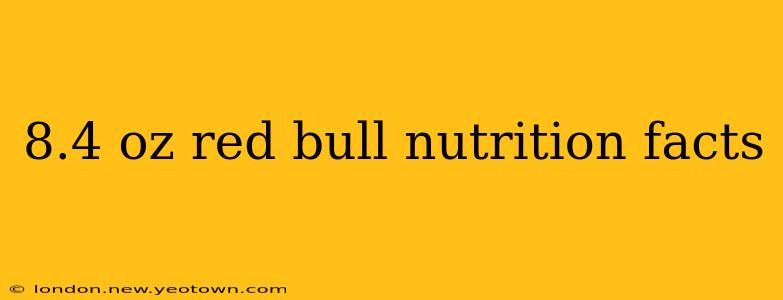Decoding the 8.4 oz Red Bull: A Deep Dive into the Nutrition Facts
Let's be honest, the vibrant red can of Red Bull has become a ubiquitous symbol of energy and late nights. But beyond the catchy slogan and the electrifying taste, what's actually in that 8.4-ounce can? Understanding the nutrition facts of your favorite energy drink is crucial, especially if it’s a regular part of your routine. This isn't just about calories; it's about making informed choices about what you put into your body.
This post will explore the nutritional breakdown of an 8.4-oz can of Red Bull, addressing common questions and concerns surrounding this popular beverage. We'll go beyond the simple numbers and explore the implications of the ingredients for your health and well-being.
What are the key ingredients in an 8.4 oz can of Red Bull?
Red Bull’s primary ingredients are carbonated water, sucrose (sugar), glucose (another type of sugar), citric acid (for that tartness), taurine (an amino acid), caffeine, and various flavorings and colorings. The exact amounts vary slightly depending on the specific flavor, but the core components remain consistent. Understanding these ingredients helps us appreciate the overall nutritional profile. For instance, the high sugar content is a major factor to consider.
How many calories are in an 8.4 oz can of Red Bull?
An 8.4 oz can of Red Bull typically contains around 110 calories. Most of these calories come directly from the sugars (sucrose and glucose), highlighting the significant impact of the sugary components on the overall caloric intake. This calorie count can add up quickly if you regularly consume multiple cans.
How much sugar is in an 8.4 oz can of Red Bull?
This is a critical question. A typical 8.4 oz can of Red Bull packs about 27 grams of sugar. To put that into perspective, that's roughly equivalent to more than six teaspoons of sugar – a substantial amount. The high sugar content contributes not only to the calorie count but also to potential health risks associated with excessive sugar consumption, like weight gain, tooth decay, and energy crashes.
How much caffeine is in an 8.4 oz can of Red Bull?
An 8.4-oz can of Red Bull typically contains around 80mg of caffeine. While the exact amount can vary slightly, it's important to be mindful of your caffeine intake, particularly if you're sensitive to caffeine or consume other caffeinated beverages throughout the day. Excessive caffeine intake can lead to anxiety, insomnia, and other adverse effects.
Is Red Bull good for athletic performance?
While Red Bull provides a temporary boost of energy due to its caffeine and sugar content, it's not considered an ideal sports drink for sustained athletic performance. The high sugar content can lead to an energy crash later, and the lack of electrolytes and other nutrients crucial for athletic recovery makes it a less effective option compared to dedicated sports drinks.
Are there healthier alternatives to Red Bull?
Yes! There are many healthier alternatives to Red Bull, including water infused with fruits and herbs, unsweetened iced tea, or even naturally caffeinated beverages like coffee (in moderation). These options tend to be lower in sugar and calories while still providing a boost of energy without the same potential downsides.
What are the potential health risks associated with regular Red Bull consumption?
Regularly consuming Red Bull can potentially lead to several health issues, including weight gain due to high sugar content, dental problems due to the acidity and sugar, sleep disturbances due to the caffeine, and potential cardiovascular issues linked to high caffeine intake. Moderation is key, and it's always best to listen to your body and assess your individual needs and tolerances.
In conclusion, while the 8.4-oz Red Bull can provide a temporary energy boost, understanding its nutritional content and potential health implications is crucial for making informed decisions about your beverage choices. The high sugar and caffeine content should be considered carefully, especially if regular consumption is part of your lifestyle. Exploring healthier alternatives is always a great approach to maintain a balanced and healthy diet.

